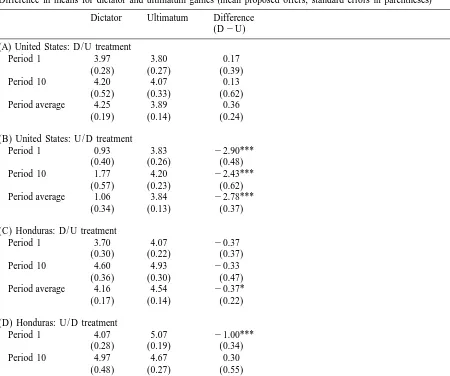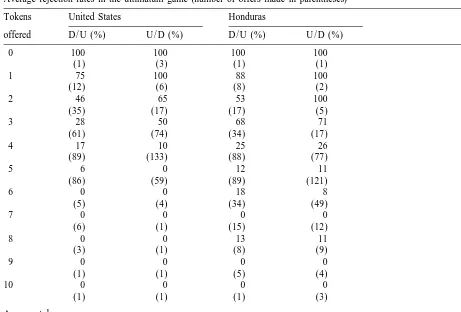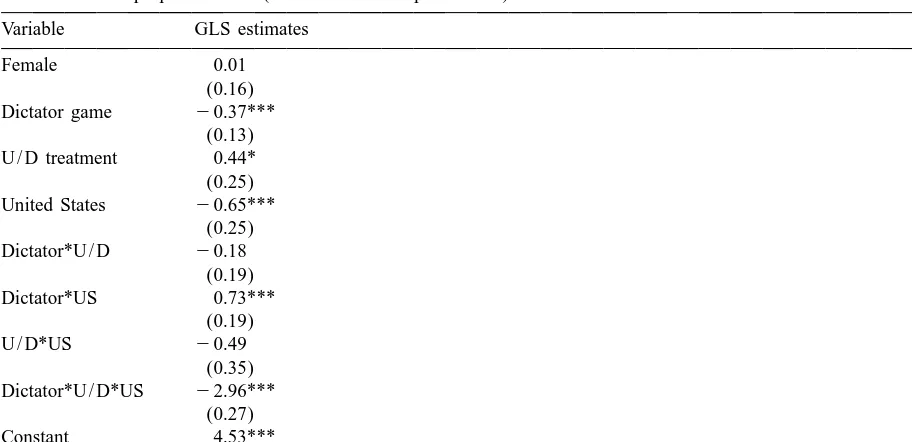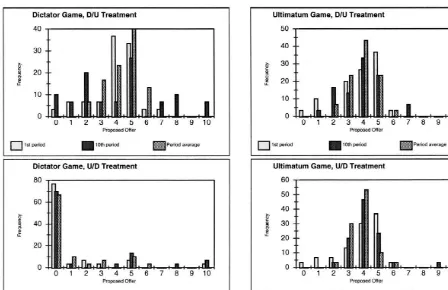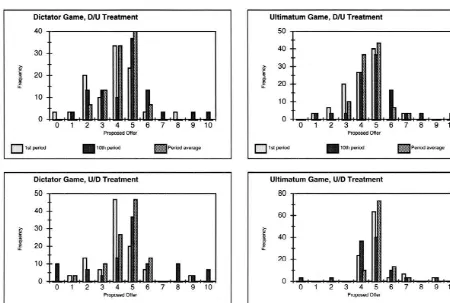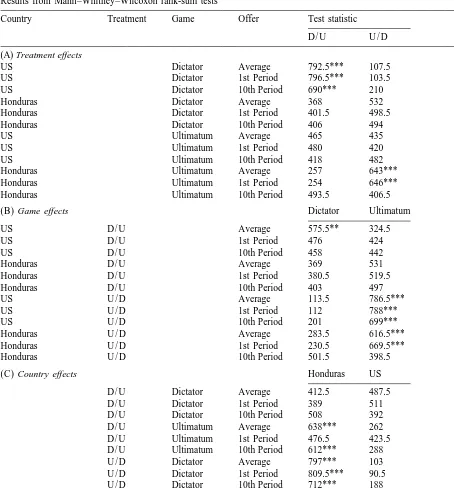www.elsevier.com / locate / econbase
Cultural differences in attitudes toward bargaining
a ,
*
a bLisa R. Anderson
, Yana V. Rodgers , Roger R. Rodriguez
a
Economics Department, College of William and Mary, P.O. Box 8795, Williamsburg, VA 23187-8795, USA b
Unidad de Apoyo Tecnico, Honduras, Honduras
Received 6 August 1999; accepted 25 April 2000
Abstract
This experimental study tests for cultural differences in attitudes toward bargaining. Individuals’ distaste for bargaining helps to explain why previous bargaining experience has a negative spillover effect on generosity in the United States but no spillover effect in Honduras. 2000 Elsevier Science S.A. All rights reserved.
Keywords: Dictator; Ultimatum; Retribution; Experiment; Gender
JEL classification: C91; J16
1. Introduction
In a widely used experimental design to examine generosity, fairness, and risk aversion in bargaining situations, two people split a pre-specified amount of money. In the dictator version of this game, one person is assigned the role of dictator and chooses how to divide the money. In the ultimatum version, one person is chosen to propose a split of the money and the other person can either accept or reject the proposal. Rejection of the proposal often results in a non-agreement payoff of zero for both participants. In practice, behavior in experiments often deviates from the predictions of economic theories. For example, few dictator experiments have generated contribution rates below the 20–30% range, and the most frequent outcome in ultimatum games is often a 50 / 50 split of the money (Davis and Holt, 1993).
Concerns for fairness are often cited as a motivating factor behind non-zero offers. However, several studies have considered other explanations. In particular, Forsythe et al. (1994) finds that the distributions of proposals in a set of paid ultimatum and dictator games differ significantly from each other, leading to the conclusion that factors other than concerns for fairness can affect proposed offers.
*Corresponding author. Tel.: 11-757-221-2359; fax: 11-757-221-2390.
E-mail address: [email protected] (L.R. Anderson).
In a review of ultimatum- and dictator-game results, Camerer and Thaler (1995) argues that manners, rather than altruism, explain some of the observed patterns of behavior. Furthermore, they provide experimental evidence that manners and concepts of fairness are learned over time as children grow. Cultural factors can also affect bargaining-game outcomes. In particular, Roth et al. (1991) conclude that cultural differences, rather than differences in experiment-related variables, result in bargaining-behavior variation across countries.
These studies do not explicitly consider the attitudes that participants have toward bargaining situations as an explanation for the experimental outcomes. Specifically, bargaining constitutes more of an everyday experience in developing countries than in most industrialized countries. Individuals in industrialized countries bargain less frequently, and they often view bargaining as a negative experience. In the purchase of a new car, the first bargaining example that comes to mind for many people, the interaction between salesperson and customer seems adversarial in nature. Dislike and distrust of the bargaining process could affect the outcomes of bargaining experiments.
This study discusses a series of bargaining experiments conducted in the United States and Honduras that explicitly test for cultural differences in attitudes toward bargaining. In a structured bargaining situation, subjects play a set of dictator games followed by or preceded by a set of
1
ultimatum games. If subjects dislike bargaining and the risk of adverse outcomes in the ultimatum game, then they may punish respondents with very small offers in the subsequent dictator game. Given the commonality of bargaining in Honduras, the experiments are expected to yield a stronger game-order effect in the United States than in Honduras.
2
2. Experimental approach
Subjects are recruited from a university in the United States and two universities in Honduras, and 3
they are paid $5 for simply showing up. We adjust for differences in purchasing power between the United States and Honduras by using the local Honduran cost of a movie ticket (30 lempiras) as the equivalent of the $5 show-up payment. Two treatments are performed in each country. In the first treatment (henceforth D/ U), the dictator game precedes the ultimatum game, and in the second treatment (henceforth U / D), the ultimatum game precedes the dictator game. Subjects are not told that the experiment consists of two games until the second game actually begins. In each treatment, subjects are randomly separated into two equally sized groups. One group acts as the ‘proposers,’ and the other group acts as the ‘respondents.’ The proposer and respondent groups sit in separate rooms and are told that they will remain anonymous to each other at all times. The bargaining takes place via unsealed notes that the person running the experiment passes back and forth between the visually isolated partners. Subjects may not communicate amongst themselves in any other way.
1
Unlike our study, Roth et al. (1991) does not compare ultimatum-game outcomes with dictator-game outcomes. Forsythe et al. (1994) also differs in that only American subjects were used and each subject played either the dictator or ultimatum game, but not both.
2
Experiment instructions, in English and Spanish, are available from the authors upon request. 3
In the dictator game, each proposer decides how to split ten tokens with a respondent, and the respondent simply records the offer. Subjects are told at the beginning that ten tokens have a value of $1 (6 lempiras). We use a rotating pairs mechanism over ten periods so that no two people are paired twice during the game. This is explained to all subjects at the beginning of the experiment. In the ultimatum game, each proposer suggests a split of ten tokens, but this time the respondent may accept or reject the offer. If the respondent accepts the split, the subjects divide the tokens as specified. If the respondent rejects the split, both of the subjects receive a payoff of zero. As in the dictator game, we perform ten periods and use a rotating pairs mechanism that is clearly explained to all subjects. Because both games give every pair the potential to split ten tokens in each of ten periods, the maximum payout for either game is 100 tokens per pair. At the end of each session, subjects are paid for one part of the experiment based on the result of a die throw. When the experiment was conducted, average earnings were $8.92 in the United States and 54.94 lempiras in Honduras. Data were collected
4 on proposed offers and rejections by subject number, sex, period, game, treatment, and country. A total of 240 people, 120 in the United States and 120 in Honduras, participated in the experiment.
3. Results
Table 1 illustrates the experimental outcomes with mean proposals made by subjects in each game, treatment, and country. It also reports a series of ‘difference in means’ estimates for proposed offers. To test for statistical significance in the difference calculations, we perform t-tests that do not restrict the data generating the two means to have equal variances. The largest difference between the two games occurs in the United States in the U / D treatment. Panel B indicates that subjects offer an average of 2.78 fewer tokens in the dictator game, when their offer cannot be rejected, than in the ultimatum game, when they face the risk of rejection. Furthermore, ultimatum proposals in panels A and B are rather similar, while the dictator proposals in panels A and B differ dramatically. Dictators offer substantially less to their partners when the dictator game comes second than when the dictator game comes first. These results may be picking up a retribution effect. After experiencing ten periods of potential and actual rejections, proposers then show retribution by making very small offers in the dictator game.
Subjects in Honduras do not exhibit the retribution effect. Panels C and D indicate that dictators propose donations of about 40% in both the D/ U and U / D treatments. These contribution rates are high relative to those found in previous dictator experiments and could signal a deeper concern for fairness in bargaining situations. Lower rejection rates in Honduras might explain the lack of retribution, and consequently, higher dictator game offers in Honduras relative to the United States. However, the data do not support this explanation. Table 2 reports United States and Honduran rejection rates for each possible number of tokens offered to the respondent in the ultimatum game. Ultimatum game offers were rejected more frequently in Honduras, and the average number of tokens
4
Table 1
a Difference in means for dictator and ultimatum games (mean proposed offers; standard errors in parentheses)
Dictator Ultimatum Difference (D2U)
(A) United States: D/ U treatment
Period 1 3.97 3.80 0.17
(B) United States: U / D treatment
Period 1 0.93 3.83 22.90***
(0.40) (0.26) (0.48)
Period 10 1.77 4.20 22.43***
(0.57) (0.23) (0.62)
Period average 1.06 3.84 22.78***
(0.34) (0.13) (0.37)
(C) Honduras: D/ U treatment
Period 1 3.70 4.07 20.37
(0.30) (0.22) (0.37)
Period 10 4.60 4.93 20.33
(0.36) (0.30) (0.47)
Period average 4.16 4.54 20.37*
(0.17) (0.14) (0.22)
(D) Honduras: U / D treatment
Period 1 4.07 5.07 21.00***
(0.28) (0.19) (0.34)
Period 10 4.97 4.67 0.30
(0.48) (0.27) (0.55)
Period average 4.42 4.98 20.56***
(0.18) (0.10) (0.21)
a
Notes: * Statistically significant at the 0.10 level; *** at the 0.01 level (two-tailed test). Sample size is 30 individuals for each mean offer. Period average is the average over ten periods for each individual.
rejected was higher in Honduras for both treatments. The difference across countries in average tokens 5
rejected was larger in the U / D treatment than in the D/ U treatment.
If lower rejection rates in Honduras cannot explain the lack of retribution in that country, then country differences in reactions to rejections must be influencing the retribution effect in the dictator game. In particular, individuals in the United States bargain less frequently and view the bargaining process with greater distaste than individuals in Honduras. When they have previously experienced an unpleasant bargaining situation in the ultimatum game, subjects in the United States then punish
5
Table 2
a Average rejection rates in the ultimatum game (number of offers made in parentheses)
Tokens United States Honduras
Note: Sample size is 30 individuals over ten periods for each treatment. Percentage figures for each token amount are number of rejections divided by number of offers made.
respondents with very small offers (often nothing) in the dictator game. The commonality of bargaining in Honduras helps to explain the lack of a game-order effect in the Honduran experiments. A similar analysis is performed for both countries with separate male and female samples; in almost all cases, differences between male and female proposals are small and statistically insignificant.
A regression analysis estimating the determinants of proposed offers yields similar cross-cultural results. Using a pooled sample of individuals across countries and periods, we regress the proposed offer on a set of binary variables for sex (15female, 05male), game (15dictator, 05ultimatum), treatment (15U / D, 05D/ U), and country (15United States, 05Honduras); a set of two-way interactions between game and treatment, game and country, and treatment and country; and a three-way interaction between game, treatment, and country. To control for unobserved person-6 specific effects across periods, we estimate a random-effects linear model using the GLS estimator. Results in Table 3 indicate a large and statistically significant coefficient for the three-way interaction
6 2
The Breusch and Pagan Lagrange multiplier test for random effects yields a significantx -test statistic, and the Hausman 2
Table 3
a Determinants of proposed offers (standard errors in parentheses)
Variable GLS estimates
Notes: * Statistically significant at the 0.10 level; *** at the 0.01 level (two-tailed test). Specification is a random-effects linear model; sample size is 2400 observations (120 individuals across 20 game-periods).
term. On average, playing the dictator game in the U / D treatment in the United States reduces the proposed offer by about three tokens. The country dummy indicates that offers are generally higher in Honduras. There is no significant difference between men and women in their proposals.
These conclusions hold when examining distributions. Figs. 1 and 2 present a series of histograms of proposed offers for experiments in the United States and Honduras. Each panel shows the frequency distribution of a particular offer amount during the first period, last period, and the average period for an individual. The histograms demonstrate a noticeable game-order effect in the United States. When the dictator game occurs first, offers of four or five units are most common, but when the dictator game occurs second, offers of zero units are most common. Histograms for Honduras do not exhibit the game-order effect.
Statistical tests confirm inferences drawn from these histograms. Table 4 presents results from Mann–Whitney–Wilcoxon tests for the equality of distributions using average, first period, and tenth
7
period observations. Panel A examines treatment effects. The strongest treatment effect is found in the dictator game in the United States, where the distribution of offers in the dictator game is significantly higher in the D/ U treatment than in the U / D treatment. There is a weaker treatment effect in Honduras using only average and first period observations. In these two cases, ultimatum offers are higher in the U / D treatment than in the D/ U treatment, but this effect disappears by the tenth period. Panel B examines game effects. In all but one case, dictator and ultimatum game offers are not significantly different in the D/ U treatment in either the United States or Honduras. However,
7
Fig. 1. Histograms of proposed offers in the United States. Notes: sample size is 30 individuals for each histogram. Period average is the average over ten periods for each individual.
with one exception, ultimatum game offers are higher than dictator game offers in the U / D treatment in both countries. Finally, the analysis of country effects in panel C shows that, across treatments and games, subjects in Honduras often make higher offers than American subjects. Under no circum-stances were United States offers significantly higher than Honduran offers. These test results support the general notion that cultural factors are important determinants of bargaining behavior. More specifically, an aversion toward the bargaining process apparently leads subjects in the United States but not Honduras to punish respondents with very small offers when the dictator game occurs second.
4. Conclusion
Fig. 2. Histograms of proposed offers in Honduras. Notes: sample size is 30 individuals for each histogram. Period average is the average over ten periods for each individual.
split. Dictator game offers in Honduras are consistently higher than those documented in similar research studies. Experiments in Honduras result in no game-order effect, despite the fact that Honduras actually has higher rejection rates in the ultimatum game relative to the United States. The stark contrast between the two countries suggests that previous bargaining experience has a negative spillover effect on generosity in the United States but no spillover effect in Honduras. This spillover effect could entail a dislike of the bargaining process and possible retribution once the bargaining ends. We find no systematic gender-related differences in the behavior of proposers or respondents in either country.
Acknowledgements
Table 4
Results from Mann–Whitney–Wilcoxon rank-sum tests
Country Treatment Game Offer Test statistic
D/ U U / D
(A) Treatment effects
US Dictator Average 792.5*** 107.5
US Dictator 1st Period 796.5*** 103.5
US Dictator 10th Period 690*** 210
Honduras Dictator Average 368 532
Honduras Dictator 1st Period 401.5 498.5
Honduras Dictator 10th Period 406 494
US Ultimatum Average 465 435
US Ultimatum 1st Period 480 420
US Ultimatum 10th Period 418 482
Honduras Ultimatum Average 257 643***
Honduras Ultimatum 1st Period 254 646***
Honduras Ultimatum 10th Period 493.5 406.5
(B) Game effects Dictator Ultimatum
US D/ U Average 575.5** 324.5
US D/ U 1st Period 476 424
US D/ U 10th Period 458 442
Honduras D/ U Average 369 531
Honduras D/ U 1st Period 380.5 519.5
Honduras D/ U 10th Period 403 497
US U / D Average 113.5 786.5***
US U / D 1st Period 112 788***
US U / D 10th Period 201 699***
Honduras U / D Average 283.5 616.5***
Honduras U / D 1st Period 230.5 669.5***
Honduras U / D 10th Period 501.5 398.5
(C) Country effects Honduras US
D/ U Dictator Average 412.5 487.5
D/ U Dictator 1st Period 389 511
D/ U Dictator 10th Period 508 392
D/ U Ultimatum Average 638*** 262
D/ U Ultimatum 1st Period 476.5 423.5
D/ U Ultimatum 10th Period 612*** 288
U / D Dictator Average 797*** 103
U / D Dictator 1st Period 809.5*** 90.5 U / D Dictator 10th Period 712*** 188
U / D Ultimatum Average 799*** 101
U / D Ultimatum 1st Period 709*** 191 U / D Ultimatum 10th Period 592.5** 307.5
References
Camerer, C., Thaler, R., 1995. Anomalies: ultimatums, dictators and manners. Journal of Economic Perspectives 9, 209–219. Davis, D., Holt, C., 1993. Experimental Economics. Princeton University Press, Princeton, NJ.
Forsythe, R., Horowitz, J., Savin, N., Sefton, M., 1994. Fairness in simple bargaining games. Games and Economic Behavior 6, 347–369.
Hogg, R., Craig, A., 1978. Introduction To Mathematical Statistics, 4th Edition. Macmillan, New York.
